Taking our hardly stellar performances of the previous rounds into consideration it rather looked like a tough job for us. Nevertheless we eventually pulled ourselves together and delivered our best performance since almost two years, blasting the opponents off the boards. The final tally read 6:2 which is just insanely high, given the fact that we were the rating favourites at only three boards out of eight.
I had the pleasure to fight a theoretical battle in a line of the Accepted Queen's Gambit, where my book just ended with "White's attack develops smoothly" but without any further lines to learn by heart. This meant that I actually had to play chess, which I haven't really done sucessfully during the recent weeks. This time it was going to be different...
Uwira (2228) - Dietz (2304)
1. d4 d5 2. c4 dxc4 3. e3 Nf6 4. Bxc4 e6 5. Nf3 c5 6. O-O a6 7. Bb3 Nbd7 8. e4!
This is the most testing move. It is recommended in Boris Avrukh's book Grandmaster Repertoire 1. d4. Before playing the move I took myself ten minutes to recollect some of the theory. However, there was not a chance that I wouldn't play the move (-:
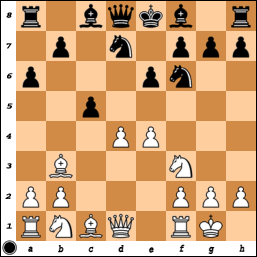
8...Nxe4 9. Qe2! Ndf6
Black tries to hang on to his pawn. Avrukh gives 9...c4 as the mainline, which returns the pawn while keeping the central lines closed. If instead 9...Nef6, Black gets overrun by 10. d5, this thrust being the main point of White's sacrifice. After the text move, Black will have to spend an awful lot of tempi and if he doesn't finally manage to castle things look sore for him.
10. Bc2 Qd5 11. Re1 Nd6 12. Nc3 Qh5?
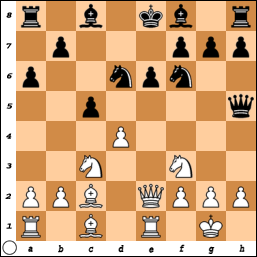
Avrukh gives 12...Qc6 13.Be3 and says that White's attack runs very smoothly. When I analysed the position this morning, the best I could find for Black was 13...cxd4 14.Bxd4 Be7 15.Ne5 Qc7 16.Ng4 where White has an overwhelming position. It is certainly enough for the pawn, and the real question is whether Black will be able to survive.
The text move, however, leads to dire consequences for Black. I again took myself some time here but eventually decided to continue the race for development, relying on not allowing Black to castle at a cheap price.
On an even better day, I might have found the paradoxical 13.Qd1! which immediately exposes the weakness of the black queen's position. White threatens 14.Re5 trapping the queen while also renewing support for the d4-d5 thrust. Black has huge problems here. The best he has is 13...Nd7 14.d5 e5 15.Nxe5 Qxd1 16.Bxd1 Nxe5 17.Rxe5+ when the black king will be stuck in the centre and there isn't any clearcut way to finish development.
After my game continuation, White still has very strong pressure, so I won't go as far as tagging it with a question mark.
13. dxc5 Qxc5 14. Be3 Qa5 15. Bf4
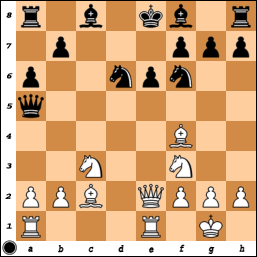
After driving the black queen to the edge of the board, White now prepares to hit the Nd6, which doesn't have good retreat squares. If Black tries to castle he'll either has to give up material or allow White to build a completely dominating position. For example 15...Be7 16.Red1! Now Black loses at least an exchange, if not the queen, after 16...Nb5 17.Qe5 Qb4 18.Na4 encircling the queen. Therefore he must protect the knight: 16...Qb6 17.Ba4+ Kf8 18.Rac1 when Black is tied up nicely.
After the game continuation, new tactics emerge at White's horizon, especially the knight sacrifice at f7, followed by the removal of the Bd7 by Rxd7. It's hard to find sensible moves for Black, so I venture the thought that he might be lost already.
15...Bd7 16. Rad1 Nb5 17. Ne5 Nxc3 18. bxc3
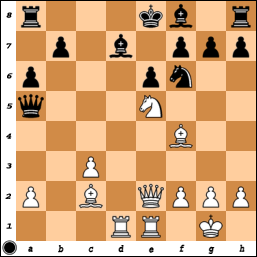
If now 18...Qxc3 then Black is taken apart by 19.Nxf7 because he can't play 19...Kxf7 20.Rxd7+ Nxd7 21.Qxe6 mate.
Black is also doomed after 18...Bc5 19.Nxf7 0-0 when the big hammer 20.Rxd7! exposes the king. If now 20...Nxd7 then 21.Bxh7+ Kxh7 22.Ng5+ Kg6 23.Qe4+ Rf5 and Black is helpless after 24.Qxe6+ Rf6 25.Qe4+ Rf5 26.g4.
With the game continuation Black at least defends e6 but the queen is now vulnerable to discovered attacks.
18...Qxa2 19. Nxf7
Rybka suggests that the simple 19.Rd2 is even stronger.
19...Bb5 20. Qd2
After 20.Nd6+ Bxd6 21.Bg6+ hxg6 22.Qxa2 Bxf4 23.g3 Black has three minor pieces for the queen. I had around 20 minutes left to make the time control and didn't want to spend the time needed to evaluate what is going on here. Instead, I opted to let Black keep his queen but only at the price of a very strong attack.
20...Ne4
The only move. Black must block the Bc2 in order to save his queen.
21. Rxe4 Kxf7 22. Be5
Now Black's queen is far away from the raging battle on the kingside. At this point I think had around ten minutes left and my opponent had even less, probably not more than two or three minutes. In a situation like that, pragmatism must usually prevail over beauty, so my opponent tucked the king away instead of returning the queen immediately with 22...Qa3.
After the game it was claimed by a kibitzing opponent, who obviously believed that there is nothing in chess he doesn't know, that my whole attack was badly conducted because Black now allegedly could have saved the game with 22...Qa3. I was completely perplexed by such a coffee house attitude as it must be very obvious that Black is still in deep trouble. In fact, Rybka tears Black apart after 22...Qa3 23.c4 Bc6 24.Rf4+ Kg8 25.Qe2 with the idea of swinging the queen to h5. Now 25...Re8 26.Qh5 Qe7 27.h3 - we even have time for this, as Black has no moves - a5 28.Bd6 Qd7 29.Bxf8 and White wins a piece.
22...Kg8 23. Rg4 Qa3 24. Qh6 Qe7 25. Bb3 g6 26. Rxg6+ hxg6
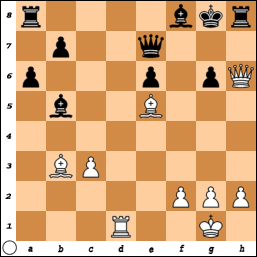
Now it was my time to be pragmatic. With maybe three of four minutes left I first calculated the endgame of the game continuation and then only had a quick look at whether 27.Qxg6+ would win. Unfortunately I didn't look long enough and therefore I missed 27.Qxg6+ Bg7 28.Bxe6+ Kf8 29.Bd6 and Black will be mated at f7.
Thus, the game missed the culmination it was due. White now enters an ending two pawns up, which should easily be enough to win after the time control.
27.Qxh8+ Kf7 28. Qh7+ Ke8 29. Qxg6+ Qf7 30. Qxe6+ Qxe6 31. Bxe6 a5 32. g4 Ra6 33. Ba2 Be2?
Black blunders a piece and now it's really over. The game ended with Black's resignation once both players were sure that they had reached the time control.
34. Re1 Bxg4 35. Bd6+ Kd8 36. Bxf8 Bh3 37. Be7+ Kd7 38. Bh4 Rb6 39. Rb1 Rxb1+ 40. Bxb1 Be6 41. Bg5 Bc4 42. h4 a4 43. Bc1 1-0


Nice game! Maybe I should trust the line Avrukh recommended instead of hanging on the move a2-a4
ReplyDeleteHehe, I prefer to wait for b7-b5 before I play a4, yo! Avrukh rulez... (-:
ReplyDelete